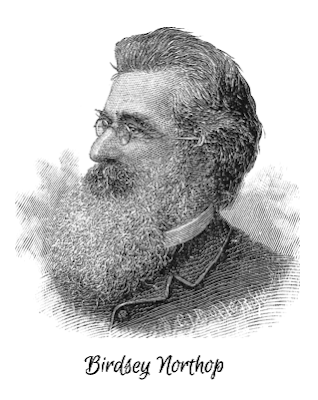The Planting Of The Apple Tree
by William Cullen Bryant
Come, let us plant the apple-tree!
Cleave the tough greensward with the spade;
Wide let its hollow bed be made;
There gently lay the roots, and there
Sift the dark mold with kindly care,
And press it o'er them tenderly,
As round the sleeping infant's feet
We softly fold the cradle-sheet;
So plant we the apple-tree.
What plant we in this apple-tree?
Buds which the breath of summer days
Shall lengthen into leafy sprays;
Boughs where the thrush, with crimson breast,
Shall haunt, and sing, and hide her nest;
We plant upon the sunny lea
A shadow for the noontide hour,
A shelter from the summer shower,
When we plant the apple-tree.
What plant we in this apple-tree ?
Sweets for a hundred flowery springs
To load the May-wind's restless wings,
When from the orchard-row he pours
Its fragrance through our open doors;
A world of blossoms for the bee,
Flowers for the sick girl's silent room,
For the glad infant sprigs of bloom,
We plant with the apple-tree.
What plant we in this apple-tree?
Fruits that shall swell in sunny June,
And redden in the August noon,
And drop when gentle airs come by.
That fan the blue September sky;
While children, wild with noisy glee,
Shall scent their fragrance as they pass
And search for them the tufted grass
At the foot of the apple-tree.
And when above this apple tree
The winter stars are quivering bright.
And winds go howling through the night,
Girls, whose young eyes o'erflow with mirth.
Shall peel its fruit by the cottage hearth;
And guests in prouder homes shall see,
Heaped with the orange and the grape.
As fair as they in tint and shape.
The fruit of the apple-tree.
The fruitage of this apple-tree,
Winds, and our flag of stripe and star,
Shall bear to coasts that lie afar,
Where men shall wonder at the view,
And ask in what fair groves they grew:
And they who roam beyond the sea
Shall think of childhood's careless day,
And long hours passed in summer play
In the shade of the apple-tree.
Each year shall give this apple-tree
A broader flush of roseate bloom,
A deeper maze of verdurous gloom,
And loosen, when the frost-clouds lower.
The crisp brown leaves in thicker shower.
The years shall come and pass; but we
Shall hear no longer, where we lie,
The summer's songs, the autumn's sigh,
In the boughs of the apple-tree.
But time shall waste this apple-tree.
Oh, when its aged branches throw
Thin shadows on the ground below,
Shall fraud and force and iron will
Oppress the weak and helpless still ?
What shall the task of mercy be.
Amid the toils, the strifes, the tears
Of those who live when length of years
Is wasting this apple-tree?
"Who planted this old apple-tree?"
The children of that distant day
Thus to some aged man shall say;
And, gazing on its mossy stem,
The gray-haired man shall answer them:
"A poet of the land was he,
Born in the rude but good old times;
'Tis said he made some quaint old rhymes
On planting the apple-tree."



